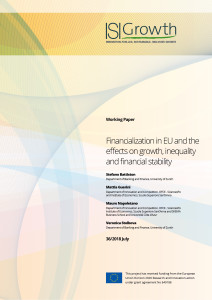In this paper brief we present empirical evidence on the patterns of increasing financialization in the EU in the last two decades, an analysis of its possible adverse effects on several objectives of the EU 2030 agenda, including inclusive growth, innovation, inequality and financial stability.
First, excessive financialization depresses economic growth because it implies that a larger fraction of credit is directed toward unfruitful investment projects, possibly generating economic crises (e.g. via housing price bubbles). Second, financialization has negative impact on innovation because the separation between actors taking risks from innovation and actors extracting rents from innovation implies lower share of reinvested profits (e.g. via short-termism and share buybacks). Third, financialization contributes to inequality by strengthening top earners bargaining power in terms of higher wages and lower taxation, as well as by burdening public budgets with fiscal assistance to financial institutions in time of crisis. Fourth, financialization may lead to financial instability by increasing both the leverage of interconnected financial institutions and the risk of mispricing of large asset classes (e.g. the dynamics of leverage and mispricing of mortgage backed securities in the run of the 2008 financial crisis).
We suggest some countermeasures that could help containing excessive financialization, including: (i) fostering the demand in the real sector; (ii) establishing mission-oriented programs by going beyond the traditional conceptual framework to fix market failures and aim to create markets where they may not exist at all; (iii) encouraging the alignment of top managers compensation schemes with long-term profit and corporate social responsible goals; (iv) studying the possibility of setting a minimal ratio on banks for lending to the real economy (to non-real estate sectors); (v) studying the possibility of setting a maximal level of intra-financial leverage for financial institutions.
Financialization in EU and the effects on growth, inequality and financial stability
Stefano Battiston
Department of Banking and Finance, University of Zurich
Mattia Guerini
Department of Innovation and Competition, OFCE – SciencesPo
and Institute of Economics, Scuola Superiore Sant’Anna
Mauro Napoletano
Department of Innovation and Competition, OFCE – SciencesPo
Institute of Economics, Scuola Superiore Sant’Anna and SKEMA
Business School and Universitè Côte d’Azur
Veronica Stolbova
Department of Banking and Finance, University of Zurich

